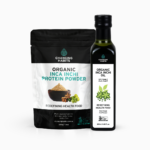What is Leptin?
Leptin is a hormone secreted by fat cells in white adipose tissue. Leptin is a master hormone and sends a signal to the hypothalamus in the brain to let it know how much fat is to be stored. It controls our hunger and feelings of satiety.
What is Leptin’s Role?
Leptin has a major role in determining many aspects of our health such as:- thyroid function, inflammation, insulin, heart health, adrenal function, reproductive and hormone health, immune function, cancer, stress, bone health and more.
However, health problems can develop when leptin levels are unbalanced within the body. But what exactly affects our leptin levels?
Factors that Contribute to Leptin Resistance
Leptin resistance is a complex issue with no singular cause, but there are many factors that can negatively impact leptin levels including:
- Stress
- Consumption of refined foods full of additives and preservatives
- High insulin levels
- Lack of quality sleep
- Exercising too much, especially if your hormones are already damaged
- GMO and non-organic, gluten containing grain consumption
- Disordered eating habits
- Chemicals
The following combination results in increased leptin levels in our bodies
- Refined, non-nutrient diet, which includes an excess of sugar and refined carbohydrates
- Chemicals bombarding our body
- Excess fat stored in the body
When a person is not in balance then their brain doesn’t sense leptin levels correctly, which builds up a resistance to the hormone. Almost all overweight people have HIGH leptin levels.
When these overweight people have difficulty controlling what they eat and how much of it, it’s because their body is insulin resistant and their brain is leptin resistant. There are too many of these hormones circulating, but they are not productive. Basically the brain thinks there is not enough fat in storage, it thinks it’s in starvation mode because leptin is not being detected by the brain, and continues to fill fat cells with fuel resulting in excess fat in the body.
But what is the best way to fix unbalanced leptin levels?
How to Fix Leptin
- Avoid processed refined foods
- Optimise your sleep and be in bed by 10pm!
- Get outside during the day, get some skin exposed to the sunshine and try to connect with nature (even if it’s for as little as 15-20 minutes)
- Don’t over exercise, this can often cause even more stress on the body
- Remove toxins from your environment and diet as they are major stressors on the body
- Address inflammation
- Calm your thoughts and practice stress management
- Focusing on your diet – or a protocol that can help to get back your leptin sensitivity = The Fat Loss Protocol (FLP)
The FLP allows you to lower your leptin levels and regain leptin sensitivity, this way leptin can begin to do its job of turning off the hunger switch and turn on the fat burning switch. Please know that the FLP isn’t a ‘cure’, it may take up to 6 months or more with a strict real food diet, one that eliminates all inflammatory foods (processed, refined foods and chemicals etc). The FLP can definitely short track this process and aid in changing the leptin resistance to leptin sensitivity over a matter of time (if followed correctly).
Once you have regained your leptin sensitivity this is what you can experience;
- Your appearance will change, hair and nails will improve, you will have less dead skin on your feet, your skin will get softer, more taut and you will have better colouring.
- Your moods will change as well as your personality and thinking. You will become more mindful, things won’t upset you quite the same, coping with life better. Your thoughts about food will be the biggest change as you begin to awaken a sixth sense and intuition into what you really should be doing for your own health.
- There will be changes in your appetite too as your carbohydrate and sweet cravings will disappear, the amount of food you need decreases, your taste buds and smell will become more acute. Sickly sweet foods will no longer be appealing to you, whereas foods like blueberries and almonds will begin to taste sweeter.
- Sleep and energy will also improve once leptin sensitivity is restored, remember this takes time but this is accelerated with the protocol.
- You won’t feel the cold quite as much even though you will exude body heat your body temperature will be lower as the thyroid settles.
- Headaches and migraines should decrease along with prolonged muscle soreness after exercise. Your libido will also heighten. If you do the 4th phase of the FLP properly you will also be able to discover any trigger foods which bring these symptoms back.
Food is one of the most powerful ways to change from being leptin resistant to leptin sensitive, there are no drugs needed, just good quality foods that our body has evolved to eat. The FLP is an education protocol about your individual body, where you will learn what foods will or will not cause you to go back to leptin resistance, create inflammation and other negative health symptoms.
If you don’t do the Phase 4 properly and learn the lessons, and you’re not prepared to make the changes to optimise your health, then you’ll be in a downward health spiral back to sugar cravings, weight gain, headaches, aches, pains, mood issues, lethargy, digestive issues, hormonal issues and so on. This protocol is about learning which foods build up your health, and which foods take it away. It’s also about making positive changes for the rest of your life, not just for 3-4 weeks. All you have to do is make the required food changes and see and enjoy the abundant health.
Additional Resources Regarding Leptin Sensitivity:
-
- Leptin for Laymen 1: https://www.youtube.com/watch?v=OjdnZ-8paXw
- Leptin for Laymen 2: https://www.youtube.com/watch?v=idm6dQuiYUQ
- Leptin for Laymen 3: https://www.youtube.com/watch?v=2crynW9i3nM
- Book: Mastering Leptin by Byron J Richards
- The Paleo Mom: https://www.thepaleomom.com/the-hormones-of-fat-leptin-and-insulin/
- Book: Primal Body Primal Mind by Nora Gedgaudas
- Mark’s Daily Apple-Mark Sisson: http://www.marksdailyapple.com/leptin/#axzz3YSxSkGyz
Jordan Pie
Nutritionist








0 Comments